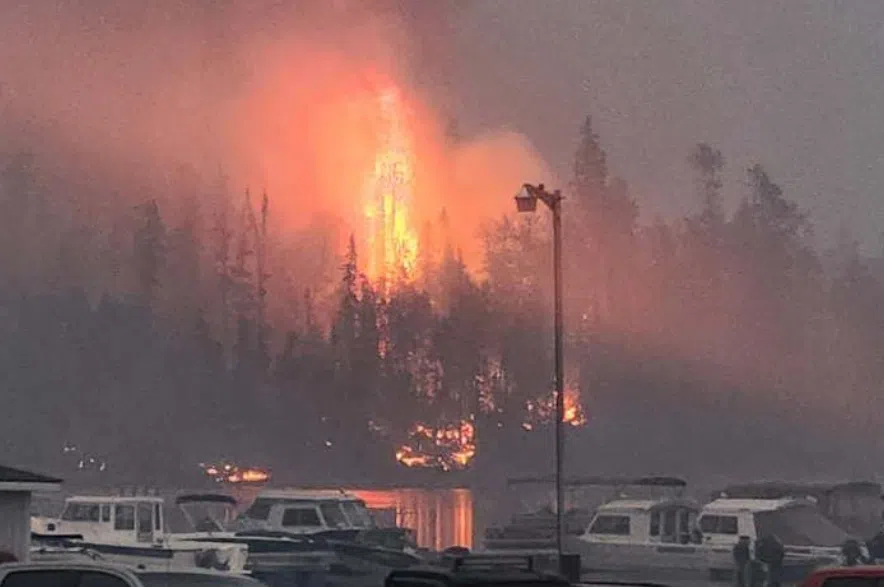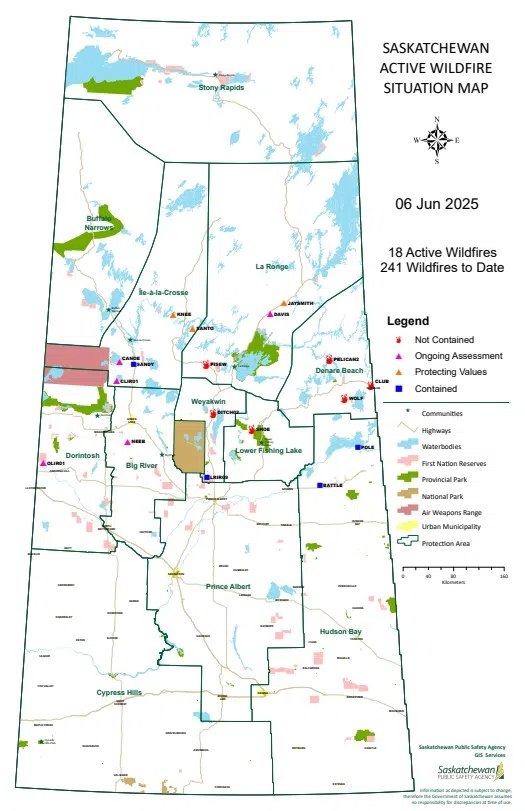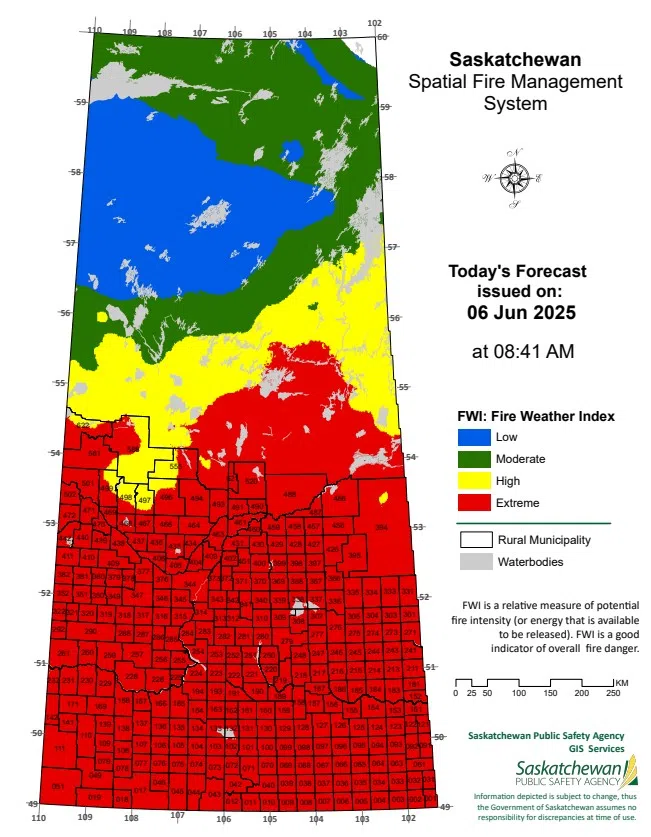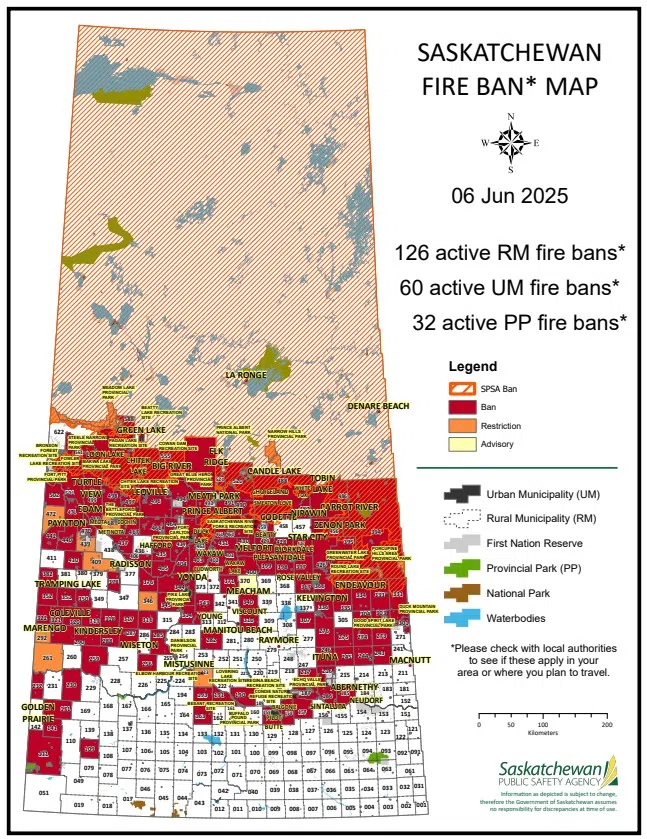Premier Scott Moe wants to reassure the province that all assets are being used to battle the ongoing wildfires in Saskatchewan and help evacuees, despite not making the call for military aid.
“We’re putting every asset that we have available — despite the questions with respect to the military — whether it’s air assets from across this nation and across the continent,” Moe said when speaking to media on Friday during the Saskatchewan Public Safety Agency’s (SPSA) daily briefing.
He said there are up to 50 air tankers in the sky, with one additional tanker the province has purchased coming soon, around 1,000 highly trained provincial firefighters, municipal fire departments and hundreds of contractors building fire guards, and all working tirelessly.
This comes after Saskatchewan NDP Leader Carla Beck called on Moe to finally ask for military aid.
Federation of Sovereign Indigenous Nations (FSIN) Chief Bobby Cameron also joined Beck in urging Moe to formally request federal military assistance.
Moe and Marlo Pritchard, SPSA President and Fire Commissioner, reiterated multiple times that they are having conversations about all forms of aid, including military and federal, every day.
“It’s an ongoing conversation,” Moe said. “It’s never a yes or no, we’re not or we are procuring or asking for military or federal supports. It’s a conversation that is very fluid and it happens at 9 a.m. every morning, and then occurs as well throughout the day.”
Read more:
- Evacuees from northern Saskatchewan finding refuge at Regina’s REAL District
- Prince Albert restaurant owner lends time, expertise to help feed fire evacuees
- Provincial fire crews continue uphill battle with mother nature and look forward to weekend rain
Moe said conversations are happening ahead of the G7 Summit in Alberta from June 15 to 17 about the potential role the military could play in Saskatchewan while it is already in the area.
“(We’re) starting to have that discussion with the military as to could they have a presence in Saskatchewan and in our communities and do some of the work in supporting the evacuation, should we need them in the days ahead,” he said.
Talks of national air tanker fleet
Moe said he is having regular conversations with Prime Minister Mark Carney, including a chat about a national air tanker fleet.
He said Saskatchewan would likely be interested in funding a portion of such a fleet.
“We have the agreements in place, not only the Canadian but North American agreements on how we would share those assets,” he said.
He said the province and federal government should seriously look into getting a significant number of large tankers that are available for provinces in times of need and even more broadly, for North America.
Moe said the province has budgeted for four additional tankers to arrive over the next number of years, one of which will be arriving soon.
“I was talking with another province the other day that are just placing their order now and those orders won’t be available till post 2030,” he said.
A number of close calls
When patients and care home residents were evacuated from La Ronge, Moe recalled a particular patient.
“At 2:30 in the morning, we had the last patient out and he was literally running out of oxygen,” he said.
Moe credits everyone involved with that evacuation, like STARS ambulance, the SPSA and SHA teams.
All the hard work hasn’t gone without a few close calls, according to Moe.
“Behind the curtain, there have been some close calls where individuals have … been missing for a period of time,” he said. “We have had no direct deaths from the fires and that is priority number one.”
He spoke to the emotions that families and loved ones are feeling during this stressful time, not only for themselves but also for their homes and what will be left behind when they return.
“Those are the most difficult conversations to have,” Moe said.
“It is unbelievable how unforgiving this fire is when it rolls through a community. And for anyone that has seen videos of communities fighting it off and, unfortunately, some communities that haven’t been able to keep it at bay, those aren’t just buildings that are in those pile of ashes, it’s people’s homes. It’s a lifetime of memories and history and pictures and mementos and heirlooms, and it’s gone and sometimes for home after home, after home, after home.”
Fires in Saskatchewan on June 6
As of 2:30 p.m. on Friday, 25 active fires were burning in the province.
SPSA said in its daily report that six of those blazes were not contained, while another 12 of the fires were under ongoing assessment and the status of three was protecting values.
Four fires were considered contained.
Contained means suppression action is taking place and the fire is not expected to grow in size, ongoing assessment means the fire is being monitored regularly to assess risk to values in the area and not contained means suppression action is taking place but the fire is expected to grow in size, according to SPSA. Protecting values means a fire is active and action is focused on protecting things like cabins and infrastructure.
As well, fire bans are active in 60 urban municipalities, 126 rural municipalities and 32 provincial parks in the province, with the fire danger considered extreme over much of the province.
SPSA says there have been 248 fires in Saskatchewan so far in 2025. The five-year average to date for Saskatchewan wildfires is 139.
— with files from NortheastNOW
Read more:














